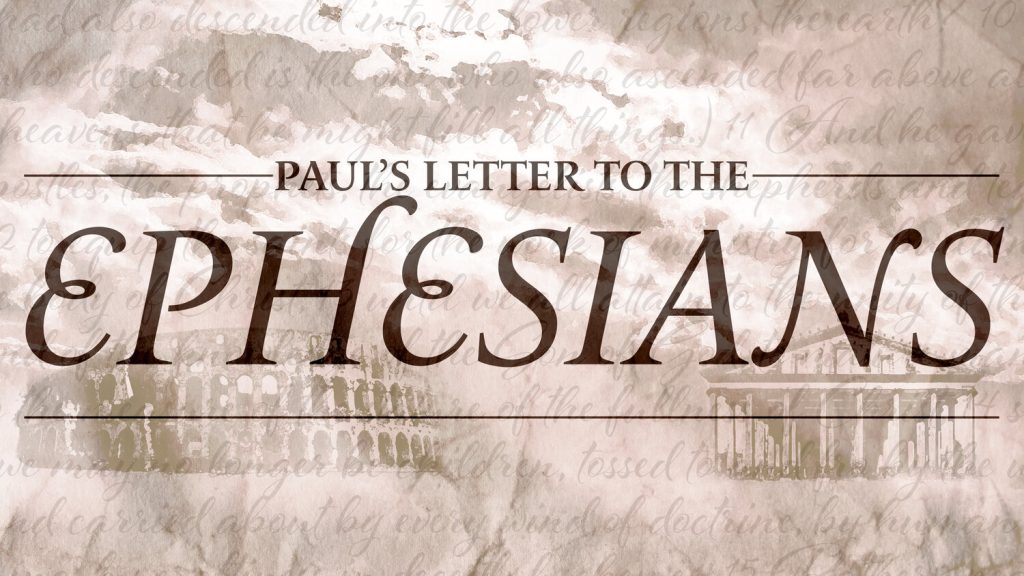This week we are reading through Ephesians 2:11-22. Here, Paul writes about the peace and reconciliation found in Christ Jesus. Similar to last week’s reading, Paul gives us a pure distillation of the gospel, which may be unsettling.
Therefore: (v.11)
One of the most powerful words in all of Paul’s writings is the word “therefore.” In formal logic, going back to centuries before Paul, “therefore” is the fulcrum of a logical argument. If the propositions preceding “therefore” are true then the following conclusions must also be true. For example, Paul uses this structure in Romans 5:1 where he connects the promise made to Abraham to its fulfillment in our justification by faith in and of Christ. Similarly, here in Ephesians, Paul reminds his audience in 1:3-2:10 of who Christ is and the benefits that Christ works, and then in our readings for Tuesday and following, Paul reminds his audience of the necessary and logical result of those propositions which is the reconciliation of all people with each other and with God.
The Distillation of the Gospel:
In these verses for Tuesday, we have the distillation of Paul’s gospel teaching. In the beginning of his book, Justification, N.T. Wright asks his readers to engage in a thought experiment whereby Ephesians is read as Paul’s magnum opus and every other letter is read in light of Ephesians. Wright summarizes the gospel message of Ephesians as follows: “God’s plan is to ‘sum up all things in Christ, things in heaven and on earth’ (Eph.1:10). As the means of that plan, God rescues both Jews and Gentiles (Eph. 1:11-14) in and through the redemption provided in Christ and by the Spirit, so that the Jew-plus-Gentile church, equally rescued by grace through faith (Eph. 2:1-10), and now coming together in a single family (Eph. 2:11-22), will be Christ’s body for the world (Eph. 1:15-23) and the sign to the principalities and power of the ‘many-splendored wisdom of God.’” pp.43-44. God’s plan and Christ’s gospel is not simply that we are individually saved by grace through faith, but “the proleptic (anticipatory) unity of all humankind in Christ as the sign of God’s coming reign over the whole world.” p.44. As our catechism reads “The ministry of lay persons is to represent Christ and his Church; to bear witness to him wherever they may be; and, according to the gifts given them, to carry on Christ’s work of reconciliation in the world.” 1979 BCP 855. This reconciliation of becoming united as one with each other and as one with God is the good news.
Abolishment of the Divisions: (vv.14-16)
The fulfillment of this gospel of reconciliation and at-one-ness is achieved when the “dividing wall of hostility” – i.e. the law of commandments and ordinances – is abolished. Although our English translations generally use one word to describe the division, Paul uses two. In verse 14, Paul says that the law is both a “partition wall (like in a house)” (Gk: mesotoichon) that separates two spaces from each other and a “fence” (Gk: phragmos) intended to keep someone out.
This partition wall and fence that kept Jews and Gentiles separate from each other and from one another are the 613 Commandments and the traditions arising therefrom contained in the Torah (Genesis – Deuteronomy). As we discussed last week, the mark of belonging to God’s community used to be obedience to the Law, but now it is Christ’s faithfulness.
For Paul, the entirety of the Old Testament Law (except the law of love) has been abolished and annulled by the Incarnation, Passion, and Resurrection of Christ Jesus. v.15. As Paul writes in Romans 13:8-10, “Owe no one anything, except to love one another; for he who loves his neighbor has fulfilled the law. . . . (for all) commandments are summed up in this sentence, ‘You shall love your neighbor as yourself.’ Love does no wrong to a neighbor; therefore love is the fulfilling of the law.” Christ destroys the Law so that a new people may be created. As we will see in the following chapters, the church is this new people of God.
SCHEDULE: The women’s Bible study starts back this Wednesday from 10am to noon. They are reading Beth Moore’s study of Esther.
Dinner is at 6. The menu is beef stroganoff. Discussion about 6:45. Compline at 8. Hope to see you here!
He has given us the power to serve under a new covenant. The covenant is not based on the written Law of Moses. It comes from the Holy Spirit. The written Law kills, but the Spirit gives life. 2 Corinthians 3:6


Pingback: Ephesians 3:7-13, Christ’s Benefits – Ancient Anglican